| |

|
DeLoG NEWSLETTER
No. 55 – 05/2021
|
|

|
| |
|
|
| |
Dear Reader,
welcome to issue No. 55 of the DeLoG Newsletter which showcases the Network’s most recent activities and offers an overview of current news stories, upcoming events and courses.
In this issue, we introduce you to Toril-Iren Pedersen from the Norwegian Agency for Development Cooperation (Norad). She shares her experience and perspective on decentralisation and the role of local governments for improving Domestic Resource Mobilisation (DRM).
Putting an emphasis on knowledge-based development cooperation, DeLoG together with Norad and the Addis Tax Initiative (ATI) conducted two webinars on local tax systems' potential for Domestic Resource Mobilisation (DRM). You can learn more about the sessions and find the reports and recordings in our section on DeLoG Activities.
We hope you enjoy this issue and encourage you to forward our Newsletter to others interested in staying updated on Decentralisation and Local Governance.
All the best and stay healthy!
Your DeLoG Team
Contact: [email protected] |
|
|

© Toril-Iren Pedersen
|
|
In-Profile – Toril-Iren Pedersen, Norwegian Agency for Development Cooperation (Norad)
''The pandemic has fostered new partnerships that I hope we can build on going forward. We need new ways of thinking around building accountable governance systems as part of the recovery.''
Toril-Iren Pedersen is the Policy Director for Tax for Development at Norad. In her interview she illustrates why local taxes play a significant role in improving subnational domestic resource mobilisation, thus ultimately ensuring better public service delivery and strengthening the social contract. Toril also highlights how Norad's work in supporting decentralisation and local governance programs on Public Financial Management demonstrated the need to bring together the DLG and tax communities. Efficient multi-level governance is fundamental for improving taxing schemes and allocation of responsibilities and resources. For more details, access her full interview on the DeLoG website.
|
| |
|
|
| |
|
|
|
|
|
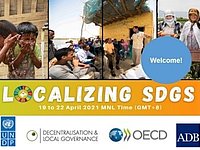
© ADB/ OECD/ UNDP/ DeLoG
|
|
Report of the Virtual Roundtables on ''Localising SDGs''
"Without meaningful engagement and tangible contributions by subnational governments, reaching the SDGs by 2030 will remain an elusive dream", stated Bruno Carrasco, Director General of Sustainable Development and Climate Change at ADB during his closing remarks of the SDG Roundtables.
ADB, OECD, UNDP and DeLoG invited actors and stakeholders from all over the world to join the discussion on localising the SDGs. During the four days of roundtables, attended by more than 800 participants from 36 countries, key enabling factors to support the localisation of the 2030 Agenda and SDGs implementation were discussed and case studies from various cities and regions were presented.
|
| |
|
|
| |
|
|
|
|
|
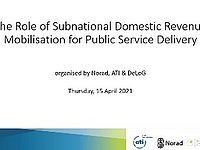
© ATI/ Norad/ DeLoG
|
|
Recording of Norad, ATI and DeLoG Webinar on ''The Role of Subnational Domestic Revenue Mobilisation for Public Service Delivery’’ Now Available
''Tax is not an end but is a means towards a well-functioning state.'', Keynote by Odd-Helge Fjeldstad, Research Professor at the Christian Michelsen Institute.
To raise awareness on the role of local governments in raising domestic revenue for public service delivery, the Addis Tax Initiative (ATI), Norad and DeLoG invited participants from all over the world to join in for a frank and open discussion. In this first webinar, the relevance of Domestic Resource Mobilisation (DRM) and its importance for state building were elaborated, as well as concrete examples of approaches to strengthen DRM at subnational level were explored.
|
| |
|
|
| |
|
|
|
|
|
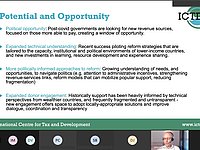
© ATI/ Norad/ DeLoG
|
|
Recording of Norad, ATI and DeLoG Second Webinar on ''Challenges and Opportunities of Property Taxation for Localising the SDGs'' Now Available
''The ability of governments to respond to local preferences depends on the fiscal autonomy that comes from own source revenues while the accountability relationship between citizens and governments can be buttressed by that tax relationship that they developed", Keynote by Wilson Prichard, International Center for Tax and Development (ICTD).
During the first webinar on local taxes for subnational DRM, property taxes emerged as a concern area. Thus the Addis Tax Initiative (ATI), Norad and DeLoG invited participants to a second webinar. The event explored property taxes' role in unlocking the revenue-raising potential of local governments. Addressing how they can help improve the fiscal space of local governments while combating inequalities, the webinar contributed to the overall goal of bringing the local governance and tax communities closer together to enhance equitable and efficient DRM at the subnational level.
|
| |
|
|
| |
|
|
|
|
|
News from our Members and Partners
|
|
|
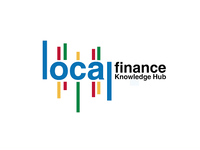
© FMDV
|
|
Launch of the Local Finance Knowledge Hub
This new platform, dedicated to local finance, highlights innovative solutions developed by local governments, national governments, public and private financial institutions and civil society. It features city practitioners and experts who present their experiences and solutions. In addition, you can find publications, live sessions and a pool of partners and experts to learn more about the development of specific programs. The interview sessions of the Local Finance Knowledge Hub open a channel to listen to the voices of the practitioners, for example on financing of sustainable urban development.
|
| |
|
|
| |
|
|
|
|
|
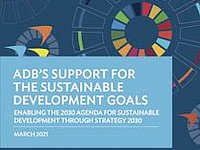
© ADB
|
|
ADB Reviews its Support for the Sustainable Development Goals
One of the Asian Development Banks (ADB) top priorities is the strengthening of institutions for localising Agenda 2030 for sustainable development. This report showcases ADB’s approach to the integration and implementation of the SDGs since they came into force in 2016. It reviews ADB’s contributions to clusters of interconnected SDGs related to people, planet, prosperity, and sustainable infrastructure, as well as ADB’s efforts to mobilise finance and knowledge in the context of SDG 17: Partnerships for the Goals. One of ADB's main topics of governance and localisation is highlighted in this report, comprising elaborations on capacity building in urban service delivery, planning and financial management, as well as inclusion of the poor and women in local governance.
|
| |
|
|
| |
|
|
|
|
|
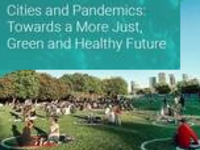
© UN-Habitat
|
|
UN-Habitat Publishes New Report on Cities and Pandemics
UN-Habitat'S report presents their findings on how cities can become more resilient and better prepared for the impact of future pandemics in a more prosperous, fair and sustainable way. The approach is grounded in human rights principles and outlines a way in which response and recovery to pandemics can lead to a New Social Contract between governments, the public, civil society and private sector. The aim is to reduce poverty and inequality, provide adequate housing and strengthen social protection while rebuilding from the pandemic. The Cities and Pandemics Report provides lessons learned and a pathway for transformative change in cities.
|
| |
|
|
| |
|
|
|
|
|
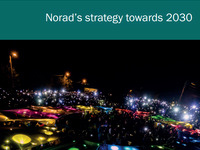
© Norad
|
|
Norad's Path Towards 2030
Norad published its new strategy for 2030 aiming to ‘’be a champion of innovation within development cooperation’’ with the 2030 Agenda as its transformative national and international roadmap. Norad wants to increase the impact at the local, national, and global level with the five strategic priorities, namely invest more strategically, be a key partner in sustainable development, contribute to a greener world, be a champion of innovation within development cooperation, strengthen and systematise development and foster the use of knowledge.
|
| |
|
|
| |
|
|
|
|
|
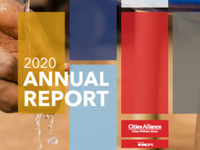
© Cities Alliance
|
|
Cities Alliance Publishes Annual Report 2020
In its Annual Report, Cities Alliance presents its efforts and activities inside the COVID-19 response and provides the reader with updated and adjusted working plans to comply with the restrictive measures put in place and the situation in each country. In five chapters you will learn about progress made in the COVID-19 response, updates on partnerships as well as on the current status and innovative ideas in country and global programmes.
The report highlights how Cities Alliance’s teams managed to carry out most of the projects’ activities and showcases the significant results achieved as well as best-practices in cities and communities all over the world.
|
| |
|
|
| |
|
|
|
|
|

© ICLEI
|
|
Raising Local Awareness for Urban Sustainability
This April the multi-part ICLEI World Congress 2021 – 2022 kicked-off with more than 1500 participants from over 115 countries in Malmö, Sweden. The virtual launch of the Congress included the announcement of the ICLEI Malmö Strategy 2021-2027 and ICLEI Malmö Action Plan 2021-2024. The congress featured a number of high-level events with a specific focus on ICLEI’s five sustainable development pathways, the contribution of local and regional governments to the UN Decade of Action on Sustainable Development (2021-2030).
|
| |
|
|
| |
|
|
|
|
|

© ADB
|
|
ADB Launches Tax Hub to Enhance Domestic Resource Mobilization and International Tax Cooperation
This open and inclusive platform aims to promote strategic policy dialogue, improve knowledge sharing, and strengthen coordination on tax policy and administration among the Asian Development Bank (ADB), its members, and development partners.
Through this engagement ADB’s developing member countries will be supported in the preparation of medium-term revenue strategies, roadmaps for the automation of tax administration, and proactive participation in international tax initiatives. The overall objective of the hub is to stimulate regional dialogue and knowledge sharing by providing regional and international resources on Domestic Resource Mobilization (DRM) and International Tax Cooperation (ITC).
|
| |
|
|
| |
|
|
|
|
|
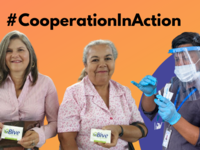
© GPEDC
|
|
Inspiring New Kampala Principles Case Studies
Set in Bangladesh, Colombia, and Uganda, these case studies by the Global Partnership for Effective Development Co-operation (GPEDC) explore inspiring stories that offer concrete examples for how leaders can integrate the Kampala Principles on effective private sector engagement in development cooperation into their own partnerships. The studies feature examples of cooperation between the private and public sectors as well as with development partners on how to create tangible impact for sustainable, inclusive development especially in the wake of COVID-19.
|
| |
|
|
| |
|
|
|
|
|
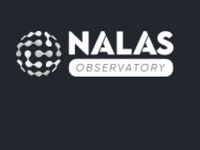
© NALAS
|
|
NALAS Opens Regional Decentralisation Observatory
The Regional Decentralisation Observatory is developed by the Network of Association of Local Authorities of South-East Europe (NALAS) as a comprehensive data repository on local government issues in South-East Europe. It aims to support the creation of better policies and better local services to citizens by providing access to timely, accurate, reliable and comparable data, indicators and information on local governance.
The Observatory includes regional comparisons across countries and indicators that can be customised, downloaded and reutilised depending on the user’s needs and preferences. It also serves as a knowledge hub on local government finance in South-East Europe.
|
| |
|
|
| |
|
|
|
|
|
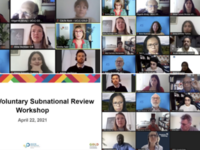
© UCLG / CIB
|
|
Road to the HLPF 2021: Voluntary Subnational Review Workshops
A series of workshops organised by UCLG GOLD and the CIB Working Group brought together the eight local government associations presenting a Voluntary Subnational Review (VSR) in the context of the High-Level Political Forum (HLPF) in 2021. VSRs are a transformative tool towards more effective multilevel governance mechanisms. They contribute to a stronger involvement of local governments in the localisation of the SDGs.
|
| |
|
|
| |
|
|
|
|
|
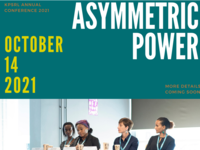
© KPSRL
|
|
KPSRL's Call for Session Proposals
The Knowledge Platform Security & Rule of Law (KPSRL) community has become increasingly vocal about seizing this moment of upheaval to redress asymmetric power structures. While the sector has long been preoccupied with inequality and injustice in societies, pressure has been mounting to address unequal power distribution within the peace and development sector itself. Power structures run from global institutions right down through local groups. For that reason, KPAC21 is seeking session proposals that address asymmetry at any given point along the spectrum.
|
| |
|
|
| |
|
|
|
|
|
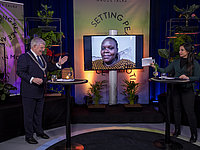
© HagueTalks/ Laura Oldenbroek
|
|
The HagueTalks & UCLG Peace Prize
On March 24, the UCLG Peace Prize Secretariat co-organised an online event launching a new publication which takes a closer look at the role that local governments and its leaders can play in ensuring sustainable and peaceful development in their communities. This event was part of the HagueTalks series and featured inspiring speakers such as the Mayors of Palermo, the Hague and Palmira, as well as peacebuilders from Croatia and Kenya.
|
| |
|
|
| |
|
|
|
|
|
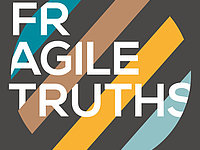
© KPSRL
|
|
New Episode of the Fragile Truths Podcast
The new Episode on ''Grounded Legitimacy: Strengthening Local Land Registration In Conflict-Affected Northern Uganda'' of the Podcast-Series Fragile Truths by the Knowledge Platform Security & Rule of Law (KPSRL) explores the legitimacy of traditional authorities and the complexities of integrating them (or not) into state governance structures. Tune in for the most important findings of cutting-edge research and capturing conversations between researchers and policy officers.
|
| |
|
|
| |
|
|
|
|
|

© United Nations
|
|
United Nations High-level Political Forum on Sustainable Development (HLPF)
When: 6 July 2021 - 15 July 2021
Where: New York City, U.S.
Apply by: TBA
One of the biggest challenges that the COVID-19 pandemic poses, is the reversion of ongoing development processes. At the same time, recovery from the crisis is an opportunity to further integrate the 2030 Agenda into long-term development strategies. The yearly High-Level Political Forum on sustainable development (HLPF) follows-up and reviews the advancement towards the 2030 Agenda and its 17 Sustainable Development Goals. This year’s HLPF specifically addresses the possibilities for a COVID-19 recovery that is not only sustainable, but also inclusive and resilient.
|
| |
|
|
| |
|
|
|
|
|

© Government of Singapore
|
|
World Cities Summit 2021
When: 21 – 23 June 2021
Where: Virtual / Hybrid
Apply by: Registration open
The World Cities Summit 2021 will be the 7th edition of the biennial event. Jointly organised by Singapore’s Centre for Liveable Cities and Urban Redevelopment Authority, the biennial Summit is a platform where local and national governments can share lessons and practices and reflect upon solutions to urban challenges for sustainable cities. It is an occasion to forge new partnerships and seek out innovative urban strategies. The Summit will be composed of a series of different events, including fora, workshops, plenaries, thematic sessions.
|
| |
|
|
| |
|
|
|
|
|
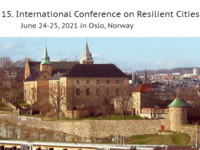
© WASET
|
|
International Conference on Resilient Cities 2021
When: 24 - 25 June 2021
Where: Oslo, Norway
Apply by: Registration open
What are resilient cities? Where should the knowledge necessary to build them come from? The International Conference on Resilient Cities (ICRC) 2021 tries to answer these questions, by uniting a variety of academia actors, including academic scientists and researchers, to exchange experiences and research on the elements that make a city capable of absorbing crises, disasters and contemporary challenges. Organised by the International Research Conference, the conference provides a platform for different actors to discuss new challenges, innovations and trends in urban resilience. |
| |
|
|
| |
|
|
|
|
|

© Andreas Komodromos
|
|
CBA15 - Local Solutions Inspiring Global Action
When: 14 June 2021 - 18 June 2021
Where: Online
Apply by: Registration open
The 15th International Conference on Community-based Adaptation to Climate Change (CBA15) brings together practitioners, grassroots representatives, local and national government planners, policymakers and donors working at all levels and scales to discuss how ambition for a climate-resilient future can be driven. The global CBA conference is held each year to enable transformative outcomes through community-led climate action. By facilitating a space for innovation and interactivity the conference supports global ambition for a climate-resilient future, and motivates all stakeholders to re-imagine solutions by sharing, learning and challenging assumptions as well as collaborating on good practices. The wider access for global climate practitioners globally helps the formation of networks and connections to address this pivotal moment in climate action.
|
| |
|
|
| |
|
|
|
|
|
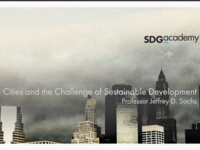
© SDG Academy
|
|
SDGs Academy's Cities and the Challenge of Sustainable Development
When: Self-paced
Where: Online
Apply by: Completion by 31 August 2021
|
| |
|
|
| |
|
|
|
|
|
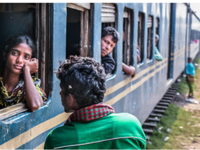
© SDG Helpdesk
|
|
FAO's Migration and Youth in Rural Areas
When: Self-Paced
Where: Online
Apply by: Registration open
|
| |
|
|
| |
|
|
|
|
|
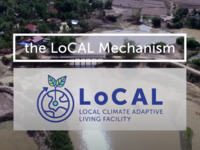
© UN Climate Change
|
|
UNCDF's Financing Local Adaptation to Climate Change: an Introduction to Performance-Based Climate Resilience Grants
When: Self-paced
Where: Online
Apply by: Registration open
|
| |
|
|
| |
|
|
|
|
|
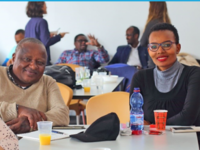
© The Hague Academy for Local Governance
|
|
The Hague Academy's Conflict, Rule of Law and Local Security
When: 11 October - 22 October 2021
Where: The Hague
Apply by: 3 September 2021
|
| |
|
|
| |
|
|
|
|
|
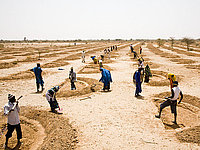
© Oxfam International
|
|
NALAS's and GIZ's Disaster Risk Management - Emergency Reponses to Vulnerable Groups
When: 6 September - 3 October 2021
Where: Online
Apply by: Registration open
|
| |
|
|
| |
|
|
|
|
|
Knowledge
|
|
|
Fragility ● Post-conflict Settings ● Migration
|
|
|
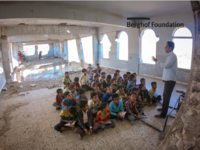
© Anas Alhajj/Shutterstock.com
|
|
Changing Local Governance in Yemen - District and Governorate Institutions in the Areas under Ansar Allah's Control
In this working paper, the Berghof Foundation analyses how local governance in Yemen is changing in the areas controlled by Ansar Allah. The paper assesses the current situation and addresses long-term drivers of conflict in those areas. These drivers include tax systems and financial and natural resource mobilisation for adequate service provision and social and political inclusion. The Berghof Foundation has been working with local authorities and the central administrations in Yemen since 2017 to strengthen inclusive local governance, support the resolution of local conflicts, and ensure that key concerns from the local level are fed into central policy-making and the peace process. Based on its work, this paper will be followed by subsequent papers that will explore changes at the local level in the region of cities Aden and Hadhramawt.
Author: Joshua Roberts
Publisher: Berghof Foundation
Publication Date: 2020
Copyright: Berghof Foundation
|
| |
|
|
| |
|
|
|
|
|
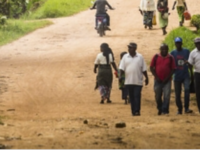
© KNOMAD
|
|
Rural-Urban Migration in West Africa: Contexts, Trends, and Recommendations
This policy brief by the Global Knowledge Partnership on Migration and Development (KNOMAD) analyses the key challenges of and links between urbanisation and rural-urban migration in the West African region. In West Africa, urban growth in the last decades has become a key challenge to sustainable development and fighting inequalities. The reasons of the migration of the rural poor towards urban centers are often ignored in policies, for example in national urban and climate policies. The brief aims at giving a concise, comprehensive overview of the main pattern of international and cross-border migration in the region and to formulate recommendations for its inclusion in migration and urbanisation policies.
Author: Eva Dick and Benjamin Schraven
Publisher: KNOMAD
Publication Date: 2021
Copyright: KNOMAD
|
| |
|
|
| |
|
|
|
|
|
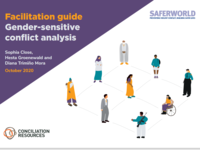
© Revangel Designs
|
|
Facilitation Guide - Gender-Sensitive Conflict Analysis
The Facilitation Guide for gender-sensitive Conflict Analysis (GSCA), developed by Conciliation Resources and Saferworld, aims to support analysis of how gender inequality shapes social, economic and political systems, institutions and structures. It can be used by analysts, policy and programme staff working on peacebuilding, conflict prevention and security, or on gender and/or women’s empowerment in conflict-affected contexts. The guide explains how to design, use and adapt tools to analyse gender, peace, violence and conflict in any given context as well as how to integrate it in policy planning and programme implementation.
Author: Sophia Close, Hesta Groenewald and Diana Trimiño Mora
Publisher: Conciliation Resources, Saferworld
Publication Date: 2020
Copyright: Conciliation Resources, Saferworld
|
| |
|
|
| |
|
|
|
|
|
Fiscal Decentralisation ● Local Finance
|
|
|
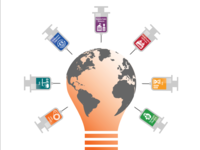
© United Nations
|
|
Financing for Sustainable Development Report 2021
The Covid-19 Pandemic has slowed down and sometimes even reversed development processes around the globe. The setback for the international Agendas for development and the SDGs has to be met with appropriate responses. While damages can already be witnessed, the crisis also presents the opportunity of renewing mechanisms and understanding the need for immediate action. The 2021 Financing for Sustainable Development Report of the Interagency Task Force addresses a broad range of issues that development finance is facing, including domestic public resources, trade and more. The report highlights the importance of the local level to address the crisis and future challenges, and to build resilient financing from the bottom up.
Author: Inter-Agency Task Force on Financing for Development
Publisher: United Nations
Publication Date: 2021
Copyright: United Nations
|
| |
|
|
| |
|
|
|
|
|
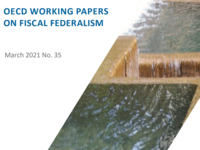
© OECD
|
|
OECD Working Papers on Fiscal Federalism
The series of OECD papers covers topics and issues related to intergovernmental fiscal relations and local/regional public finance. This includes tax and spending assignment across government levels, intergovernmental grants and local and regional public service efficiency as well as issues such as intergovernmental fiscal management and sub-central fiscal rules. The latest publications explore topics such as funding of local governments public investment and public health decentralisation in light of COVID-19. The papers are outputs of the OECD Network on Fiscal Relations Across Levels of Government.
Publisher: OECD
Publication Date: 2021
Copyright: OECD
|
| |
|
|
| |
|
|
|
|
|
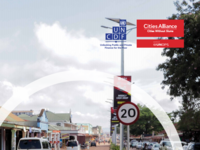
© Charlotte Hallqvist/Cities Alliance
|
|
National Enablers for Infrastructure: Investment and Economic Development In Secondary Cities In Ghana and Uganda
It has become evident that access to investment at local level is on the one hand challenging to reach, on the other hand, an opportunity for sustainable development. The Local Economic Acceleration through Partnerships (LEAP), a joint project of the United Nations Capital Development Fund (UNCDF) and Cities Alliance, aims at supporting all actors involved in addressing obstacles to investment in cities. This report is a product of the implementation of LEAP in four cities in Uganda and Ghana. It explores the role of national actors for financing infrastructure and local development and provides findings and recommendations for possible activities in both countries.
Author: Nii Moi Thompson
Publisher: UNCDF, Cities Alliance
Publication Date: 2021
Copyright: UNCDF, Cities Alliance
|
| |
|
|
| |
|
|
|
|
|
2030 Agenda ● Localising the SDGs
|
|
|
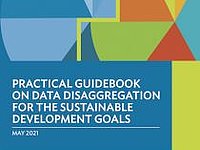
© Rhommell Rico
|
|
Practical Guidebook on Data Disaggregation for the SDGs
Since the 2012 UN Conference on Sustainable Development, the introduction of the 2030 Agenda and the Sustainable Development Goals (SDGs), it has become increasingly clearer that one of the biggest challenges for the guiding principle of leaving no one behind is the lack of appropriately granular data about demography. This guidebook was developed by the Asian Development Bank (ADB) and the Statistics Division of the United Nations Department of Economic and Social Affairs (UNDESA) to address the challenge of collecting, integrating and sharing disaggregated data about marginalised groups and their progress towards the SDGs. The guide is intended for statisticians, national statistics offices, planning and sector ministries just as much as for researchers, academics, civil society organisations, the private sector and information providers. Its ultimate goal is to strengthen the use of existing statistical sources, methods and tools to monitor and understand the needs of vulnerable or marginalised groups.
Publisher: ADB
Publication Date: 2021
Copyright: ADB
|
| |
|
|
| |
|
|
|
|
|
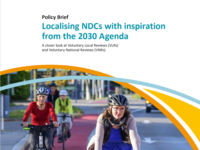
© Alexander Rochau
|
|
Localising NDCs with Inspiration from the 2030 Agenda. A Closer Look at Voluntary Local Reviews (VLRs) and Voluntary National Reviews (VNRs)
This policy brief, developed by the Collaborative Climate Action, analyses the process and the challenges of localising the Nationally Determined Contributions (NDCs) and the Paris Agreement through the lenses of the lessons learnt from localising the SDGs. It gives recommendations on the need for clear national localisation strategies and multi-level cooperation. A central instrument used are the Voluntary Local Reviews (VLRs) to enable a bottom-up approach.
Author: Petter Lydén, Christian Deutschmeyer
Publisher: GIZ
Publication Date: 2021
Copyright: GIZ
|
| |
|
|
| |
|
|
|
|
|
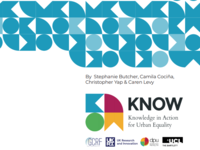
© KNOW - Knowledge in Action for Urban Equality
|
|
Localising the Sustainable Development Goals: An Urban Equality Perspective
How can we address the interconnection between urbanisation and inequalities? In this brief, Knowledge in Action for Urban Equality (KNOW) takes an urban equality approach to the localisation of the SDGs. It presents experiences and research from various cities to create synergies between goals, to strengthen focus on local context and thus focus on the perspective of inclusive outcomes. It also gives recommendations on how to advance on implementing such methods and processes.
Author: Stephanie Butcher, Camila Cociña, Christopher Yap, Caren Levy
Publisher: KNOW
Publication Date: 2021
Copyright: KNOW
|
| |
|
|
| |
|
|
|
|
|
Urban and Territorial Governance
|
|
|
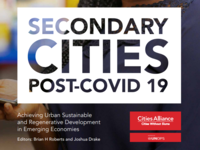
© Cities Alliance/Cities Without Slums
|
|
Secondary Cities Post-Covid 19 - Achieving Urban Sustainable and Regenerative Development in Emerging Economies
16% of the world's population live in secondary cities, serving population both in metropolitan regions and smaller regional cities and rural areas. While, they are crucial in supporting response and recovery from COVID-19, they are often ignored by policies and investment especially in developing countries. In this report, Cities Alliance addresses the challenges and emerging opportunities that COVID-19 offers for investing in secondary cities. Through it, leaders and policymakers as well as other actors and stakeholders concerned with urban development globally, have access to knowledge about the development pathways and recommendations for the post-COVID-19 era.
Author: Serge Allou, Michael Cohen, Mitchell Cook, Joshua Drake, Rene Peter Hohmann, Joe Leitmann, Mike Lindfield, Omar Siddique, Jamie Simpson, Brian H. Roberts, Bernadia Tjandradewi, Clare Short
Publisher: Cities Alliance, UNOPS
Publication Date: 2021
Copyright: Cities Alliance, UNOPS
|
| |
|
|
| |
|
|
|
|
|
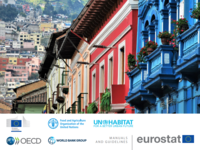
© Alessandro Pinto/Shutterstock.com
|
|
Applying the Degree of Urbanisation - A Methodological Manual to Define Cities, Towns and Rural Areas for International Comparisons
Developed by the European Commission, the Food and Agriculture Organization of the United Nations (FAO), the United Nations Human Settlements Programme (UN-Habitat), the International Labour Organization (ILO), the Organisation for Economic Co-operation and Development (OECD) and The World Bank, this manual aims to complement definitions of cities, towns and rural areas given by national statistical offices (NSOs) and ministries, through the degree of urbanisation, to ease the task of making international comparisons and classifying territories. Data producers, suppliers and statisticians can use the manual as a framework for their methodology and to ensure coherent data collection. It is particularly interesting for subnational statistics to be used for policy and decision-making.
Publisher: European Commission
Publication Date: 2021
Copyright: European Union, FAO, UN-Habitat, OECD, The World Bank
|
| |
|
|
| |
|
|
|
|
|
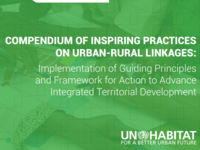
© UN-Habitat
|
|
Compendium of Inspiring Practices on Urban-Rural Linkages: Implementation of Guiding Principles and Framework for Action to Advance Integrated Territorial Development
Processes and trends like migration, climate change and urbanisation have been contributing to the divide between rural and urban areas, shifting allocation of resources and strongly affecting inequalities, polarisation and poverty in both environments. The COVID-19 pandemic drastically changed the way we live and move and stressed the importance of urban-rural linkages for service delivery, supply chains, restrictions to human mobility and much more. These linkages are key for recovery, sustainability and resilience of cities and territories. The second edition of the UN-Habitat "Compendium of Inspiring Practices on Urban-Rural Linkages" gives insights and recommendations from 17 case studies aiming at strengthening urban-rural linkages for resilience and integrated territorial development. The principles can be applied to policies, strategies, programmes and investment plans.
Author: Camilo A. Romero Mera
Publisher: UN-Habitat
Publication Date: 2021
Copyright: UN-Habitat
|
| |
|
|
| |
|
|
|
|
| |

|
|
|
| |
|
|
| |
For access to even more inspiring publications on
1. DLG in Contexts of Fragility, Migration and Post-Conflict Settings,
2. Fiscal Decentralisation and Local Finance,
3. Localising the 2030 Agenda or
4. Urban and Territorial Governance
make sure to visit the regularly updated "Knowledge Section" of our DeLoG Website!
|
|
|






































